David Guy Compton, August 19, 1930 — November 10, 2023
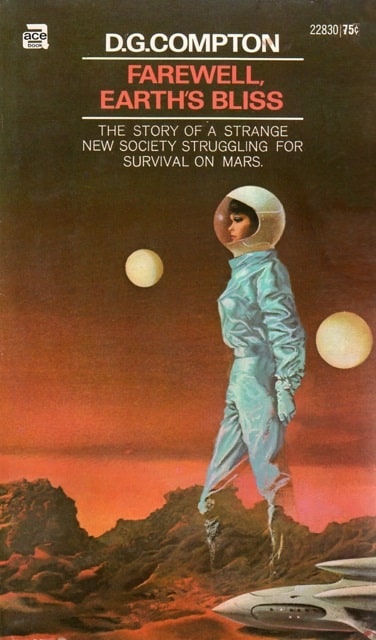 |
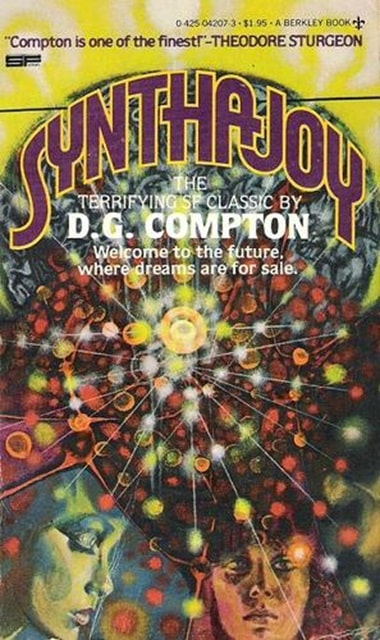 |
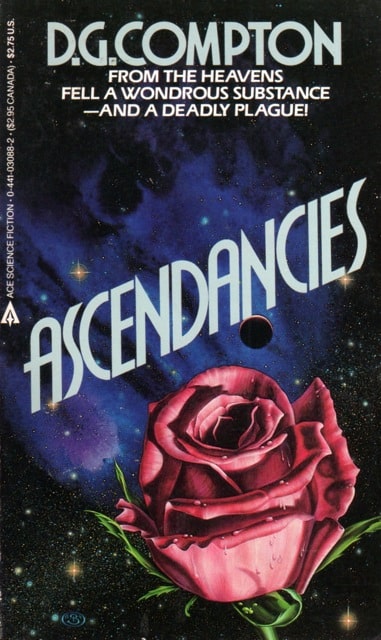 |
Farewell, Earth’s Bliss (Ace Books, 1971), Synthajoy (Berkley Books, September 1979), and
Ascendancies (Ace, January 1985). Covers by Reginald Lloyd, Richard Powers, and Barclay Shaw
I learned this week that David Guy Compton died on November 10. He was born on August 19, 1930, in London, the child of two actors. He lived to the age of 93.
He wrote SF as “D. G. Compton,” mysteries as “Guy Compton,” romance novels as “Frances Lynch,” and also radio plays, some non-fiction (including a book about stuttering), and some non-genre books, including his last, a semi-autobiographical novel called So Here’s Our Leo, from 2022.
He had his greatest success with his science fiction, especially a dozen novels published between 1965 and 1980, of which the best known is The Continuous Katherine Mortenhoe (1974), published in the US as The Unsleeping Eye, and made into a well-regarded movie, Death Watch (1980), directed by Bernard Tavernier. But all of these novels were provocative and original — really unlike what anyone else was doing. I particularly recommend Farewell, Earth’s Bliss (1966), The Steel Crocodile (1970), and Ascendancies (1980).
[Click the images for bigger versions.]
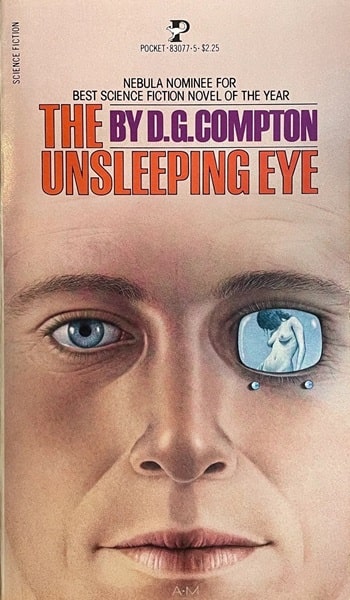 |
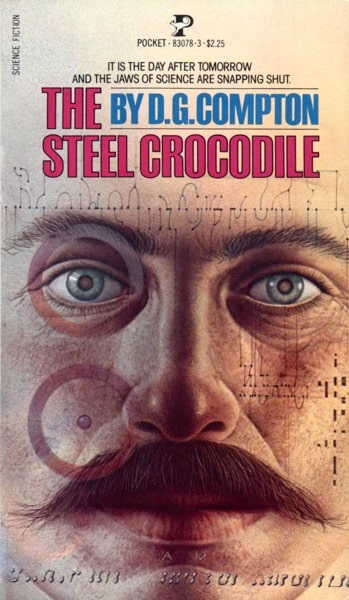 |
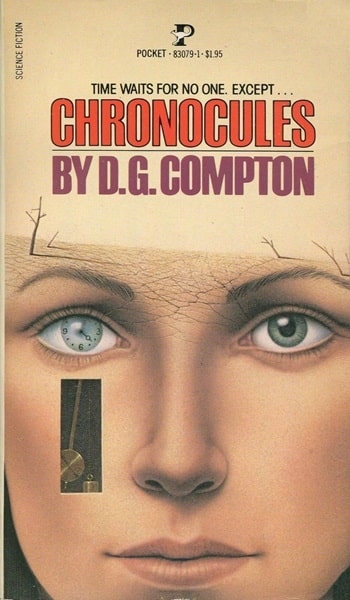 |
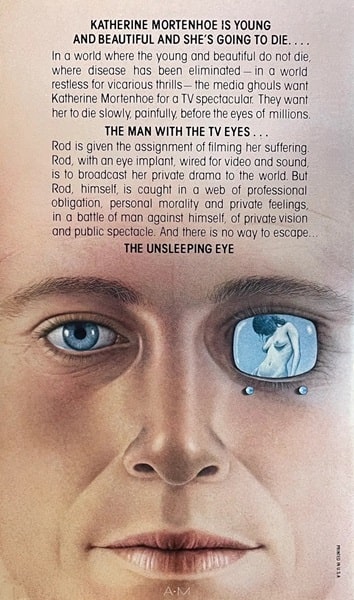 |
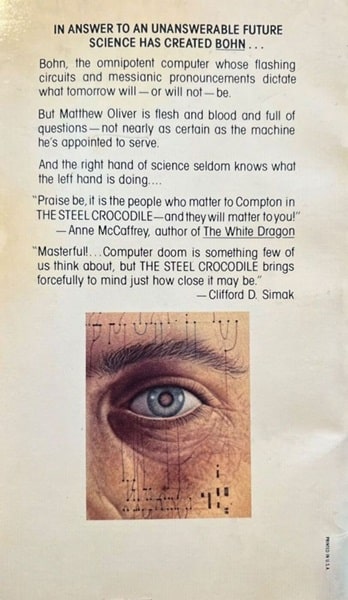 |
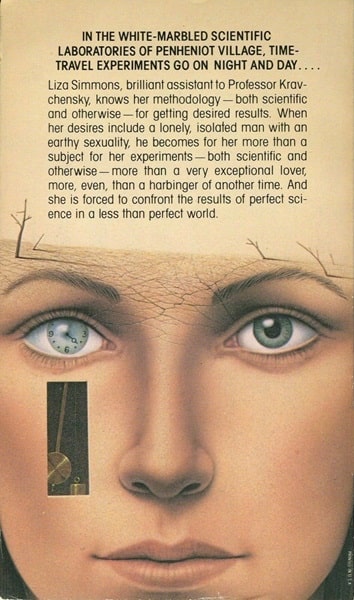 |
Pocket editions of D.G. Compton: The Unsleeping Eye, The Steel Crocodile
and Chronocules (February, April, and July 1980). Covers by Alan Magee
He was, it seems, never an overwhelming commercial success — his work was too knotty, too uncompromising, too unexpected, for that. His only appearance on a final ballot for a major award was for the 1971 Nebula for Best Novel for The Steel Crocodile. After 1980 he published five more SF novels, but none found an American publisher. Ironically, it was at about this time (around 1981) that he moved to the US, and he lived for much of the rest of his life in Maine.
His crime novels were written in the early 1960s, and he told me to ignore them — they weren’t the work he was proud of. His romance novels came in the mid-70s — I’ve read one of those, A Dangerous Magic, and I found it quite enjoyable, though not at the level of his best SF.
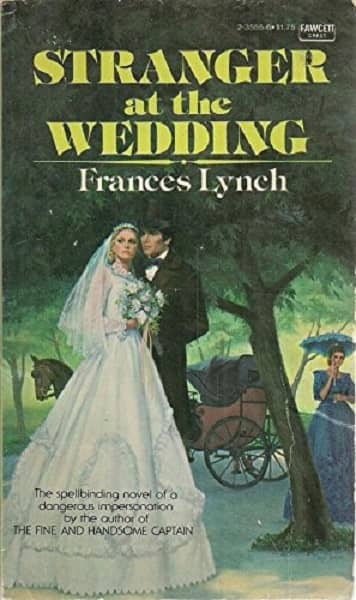 |
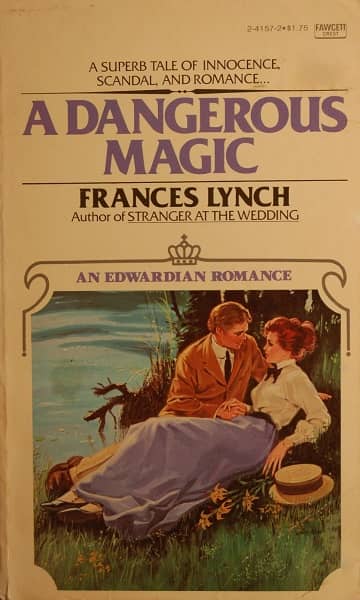 |
The romance novels of D.G Compton (as Frances Lynch): Stranger at the Wedding
(Fawcett, May 12, 1978) and A Dangerous Magic (Fawcett, October 12, 1979)
It was always clear that Compton was a major writer who never found a mass audience. And so he received two awards that were aimed at bringing deserved attention to neglected writers: the SFWA Author Emeritus in 2007, and the Cordwainer Smith Rediscovery Award in 2021.
I had a hand, as a member of the Cordwainer Smith Rediscovery Award jury, in selecting Compton for the latter award, and in the process I had the honor of informing him of his award, and of corresponding with him. We had one phone call, and several emails, over the past couple of years. David was a lovely correspondent — more self-deprecating than his accomplishments deserved, open about his publishing history, and in all ways, simply a sweet man.
I’ll quote a few small passages from his emails to me, which shed some light on his writing and publishing history, and also show off his self-deprecatory side. How he got into SF:
I’d done The Quality of Mercy as a straight novel, a break-away from the very amateurish crime ones. It was my publisher, Hodder & Stoughton, who said it was SF and asked me if I’d mind them marketing it as such.
Why he stopped publishing:
I stopped writing SF because publishers quite reasonably got tired of losing money on me. Only one of my SF books – Katherine Mortenhoe on account of the movie – earned its advance.
His comments on Ascendancies, a novel he particularly recommended to me:
As for Ascendancies, I’ve always been fonder of that. It’s lighter than most of my stuff, and not really SF at all… superficially it’s all about human class relationships. Hence the title.
And, finally, something Don Wollheim said to him:
I’ll never sell many of your books but the best people will come to your funeral.
I have no doubt of the latter, and while the first part of Wollheim’s statement is likely true, it’s a sad thing. And kudos to Wollheim for publishing as much of Compton’s work as he did.
Death Watch BluRay (2012), based on The Unsleeping Eye
At the Nebula Awards weekend in New York, May 12, 2007, where David received SFWA’s Author Emeritus award, Darrell Schweitzer conducted an extensive interview with him for The New York Review of Science Fiction, which eventually appeared in its entirety at Black Gate in 2019.
At Readercon in 2023 we had a panel on D. G. Compton’s novels, with me, a Midwesterner, joining three New Englanders (Gregory Feeley, from Connecticut; Brett Cox, from Vermont; and Steven Popkes, from Massachusetts) discussing Compton, a decades-long resident of Maine. Readercon invited Compton to attend, but he politely declined, for health reasons. We did our best to promote David’s work — which has always deserved more recognition than it received.
It is too late now to tell David in person how much his work meant to us, nor to allow him the satisfaction of seeing his work read more widely — but it’s not too late for all of us to encounter D. G. Compton’s novels (and his few short stories) again, or for the first time — and I trust this will be rewarding.
Rich Horton’s last article for us was a review of The Shores of Kansas by Robert Chilson. His website is Strange at Ecbatan. Rich has written over 200 articles for Black Gate, see them all here.

I really had no idea that D. G. Compton was still alive, but I am sad to hear of his death. I remember reading his books in the 70s, and he was one of the authors whose books I searched out and read avidly.
New York Review Books Classics put out a new edition of The Continuous Katherine Mortenhoe a few years back, with a nice introduction by Jeff VanderMeer. NYRB has brought some nice older sf back into print over the years, including a Sheckley collection and David Bunch’s Moderan stories.
Thank you for the kind obituary and the selections from your conversations with him. I need to read the longer interviews. I am a HUGE fan of his work — particularly The Continuous Katherine Mortenhoe and Farewell, Earth’s Bliss (using your words, a particularly knotty expose of American racism and crime).
Oh, and I also thoroughly enjoyed the Tavernier movie adaptation — indirectly recommended for its look at the Glasgow of the late 70s. Albeit, I’m already a fan of the director and have seen quite a few of his films including his best Coup de Torchon (1981).
[…] (9) A WRITER WHO SHOULD NOT BE OVERLOOKED. Rich Horton’s obituary of D.G. Compton is posted at Black Gate: “David Guy Compton, August 19, 1930 — November 10, 2023”. […]